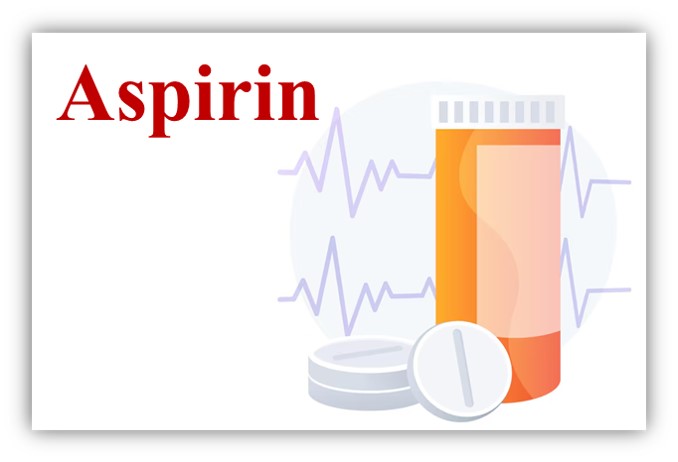OVERVIEW
Aspirin also known as acetylsalicylic acid, is a widely used drug with analgesic, anti-inflammatory, antipyretic, and antiplatelet properties.

DOSAGE
Pain Relief and Fever
Adults:
Typical dose: 325 mg to 650 mg every 4 to 6 hours as needed.
Maximum daily dose: 4,000 mg (but consult a doctor for higher doses).
Children:
Dosage for children under 12 should be determined by a healthcare provider, as it is not recommended due to the risk of Reye’s syndrome.
Anti-inflammatory Use (e.g., Arthritis)
Adults:
Common doses range from 3,000 mg to 5,000 mg per day, divided into smaller doses.
Cardiovascular Protection
Adults:
Low-dose aspirin (81 mg to 325 mg) is often recommended for those at risk of heart attack or stroke. The typical maintenance dose is 81 mg daily.
MECHANISM OF ACTION
Inhibition of Cyclooxygenase (COX) Enzymes
COX-1: This enzyme is involved in the production of thromboxane A2 which promotes platelet aggregation and is important for normal blood clotting.
COX-2: This enzyme is mainly responsible for the synthesis of prostaglandins which cause inflammation, pain, and fever.
Reduction of Prostaglandin Synthesis
Anti-inflammatory Effects: Reduced prostaglandins lead to decreased inflammation and pain.
Antipyretic effect: Low levels of prostaglandins help reduce fever by acting on the hypothalamus, which regulates body temperature.
Antiplatelet Action
- Irreversible inhibition of COX-1 in platelets by aspirin decreases the formation of thromboxane A2, leading to decreased platelet aggregation.
- This action makes aspirin effective at preventing blood clots from forming, thereby reducing the risk of heart attack and stroke.
ADVERSE DRUG REACTIONS
Gastrointestinal Issues
Gastric Irritation: Can cause stomach upset, nausea, and indigestion.
Ulcers: Prolonged use may lead to peptic ulcers or gastrointestinal bleeding.
Hemorrhage: Increased risk of bleeding in the gastrointestinal tract.
Allergic Reactions
Rash: Skin rashes or hives may occur.
Anaphylaxis: Severe allergic reactions, though rare, can happen.
Reye’s Syndrome
A rare but serious condition associated with aspirin use in children and teenagers with viral infections. It can cause swelling of the liver and brain.
Renal Effects
Possibility of decreased kidney function, especially in individuals who already suffer from kidney disease.
Hematologic Effects
Bleeding Disorders: Its antiplatelet effects increase the risk of bleeding, which can be problematic for individuals with clotting disorders.
Respiratory Reactions
Asthma Exacerbation: In some individuals, aspirin may trigger an asthma attack or worsen respiratory conditions, particularly in those with aspirin-sensitive asthma.
Central Nervous System Effects
Tinnitus: Ringing in the ears, especially at higher doses.
Headaches: Some may experience headaches as a side effect.
CONTRAINDICATION AND WARNING
Contraindications
Allergy to aspirin or salicylate: Individuals with hypersensitivity to aspirin or other salicylate-containing drugs should avoid its use.
Active gastrointestinal bleeding: Aspirin may increase bleeding, so it should not be used in patients with active peptic ulcers or gastrointestinal bleeding.
Severe kidney damage: People who have severe kidney disease should generally avoid aspirin because of the risk of kidney damage.
Reye’s syndrome: Aspirin is not given to children and teenagers with viral infections (e.g., influenza, chickenpox) because of the risk of Reye’s syndrome, a serious condition affecting the liver and brain.
Uncontrolled asthma: In individuals with aspirin-sensitive asthma, aspirin use can trigger an asthma attack.
Bleeding disorders: Patients who are at increased risk of bleeding, such as those with hemophilia or von Willebrand’s disease, should avoid aspirin.
Warnings
Gastrointestinal risks: Long-term use may increase the risk of gastrointestinal ulcers and bleeding. Monitoring is advised for individuals with a history of gastrointestinal problems.
Surgery: Aspirin use should be stopped before elective surgery or dental procedures because it has antiplatelet effects, which may cause excessive bleeding.
Cardiovascular disease: Patients with a history of cardiovascular problems should use aspirin under medical supervision, especially at higher doses.
Pregnancy and breastfeeding: Aspirin use during pregnancy, especially in the third trimester, can be risky to the fetus. It should only be used if clearly needed and under the guidance of a doctor.
Asthma: Individuals with a history of asthma should be monitored for any respiratory reactions, particularly if they have previously experienced aspirin-induced bronchospasm.
DRUG-DRUG INTERACTIONS
Anticoagulants
Warfarin: increased risk of bleeding. If used together, careful monitoring of coagulation parameters is necessary.
Direct oral anticoagulants (DOACs): Such as dabigatran or rivaroxaban, may also increase the risk of bleeding.
NSAIDs
Taking aspirin with other NSAIDs may increase the risk of gastrointestinal bleeding and ulcers. It may also reduce the cardioprotective effect of low-dose aspirin when taken together.
Corticosteroids
The risk of gastrointestinal ulcers and bleeding may increase when aspirin is used with corticosteroids.
Methotrexate
Aspirin may interfere with the elimination of methotrexate, thereby increasing its toxicity.
Alcohol
The simultaneous use of alcohol and aspirin may increase the risk of gastrointestinal bleeding.
Antihypertensive Drugs
Aspirin may reduce the effectiveness of some antihypertensive medications, such as ACE inhibitors and diuretics, although this effect can vary.
Uricosurics
Aspirin may interfere with the effects of uricosuric agents (eg, probenecid) used to treat gout, especially at low doses.


4 thoughts on “Aspirin”